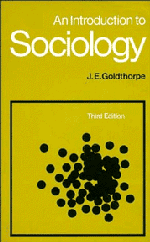Book contents
7 - Aggression, conflict and social control
Published online by Cambridge University Press: 05 July 2011
Summary
Social control, the subject of this chapter, has a number of interrelated aspects. We consider first the control of aggression. This leads us into a discussion of conflict and the two great rival views of the nature of human society itself, the ‘consensus’ view and the ‘coercion’ view. We then consider how culture, the distinctively human characteristic, involves particular modes of settling disputes and resolving conflicts. Among these we specially consider the nature of authority and the sanctions that sustain it; and this in turn brings us to look at the nature of the communities which are united by subjection to a common authority. Finally, we return to a more detailed consideration of the institutions – military and police – through which violence is controlled in modern societies; ‘the police idea’, and military rule.
THE CONTROL OF AGGRESSION
In his book On aggression, the biologist Konrad Lorenz examines the functions of intra-specific aggression (that is, attacks on members of the same species) in the animal kingdom generally, and ends with some consideration of the same question in man.
Intra-specific aggression is by no means universal among animals, but it is found in so many species as to raise the question ‘What is it good for?’ A behaviour pattern so common is clearly not to be thought of as a merely negative destructive force; the presumption is that it must be good for something, that is, it must have a function.
- Type
- Chapter
- Information
- An Introduction to Sociology , pp. 163 - 192Publisher: Cambridge University PressPrint publication year: 1985



